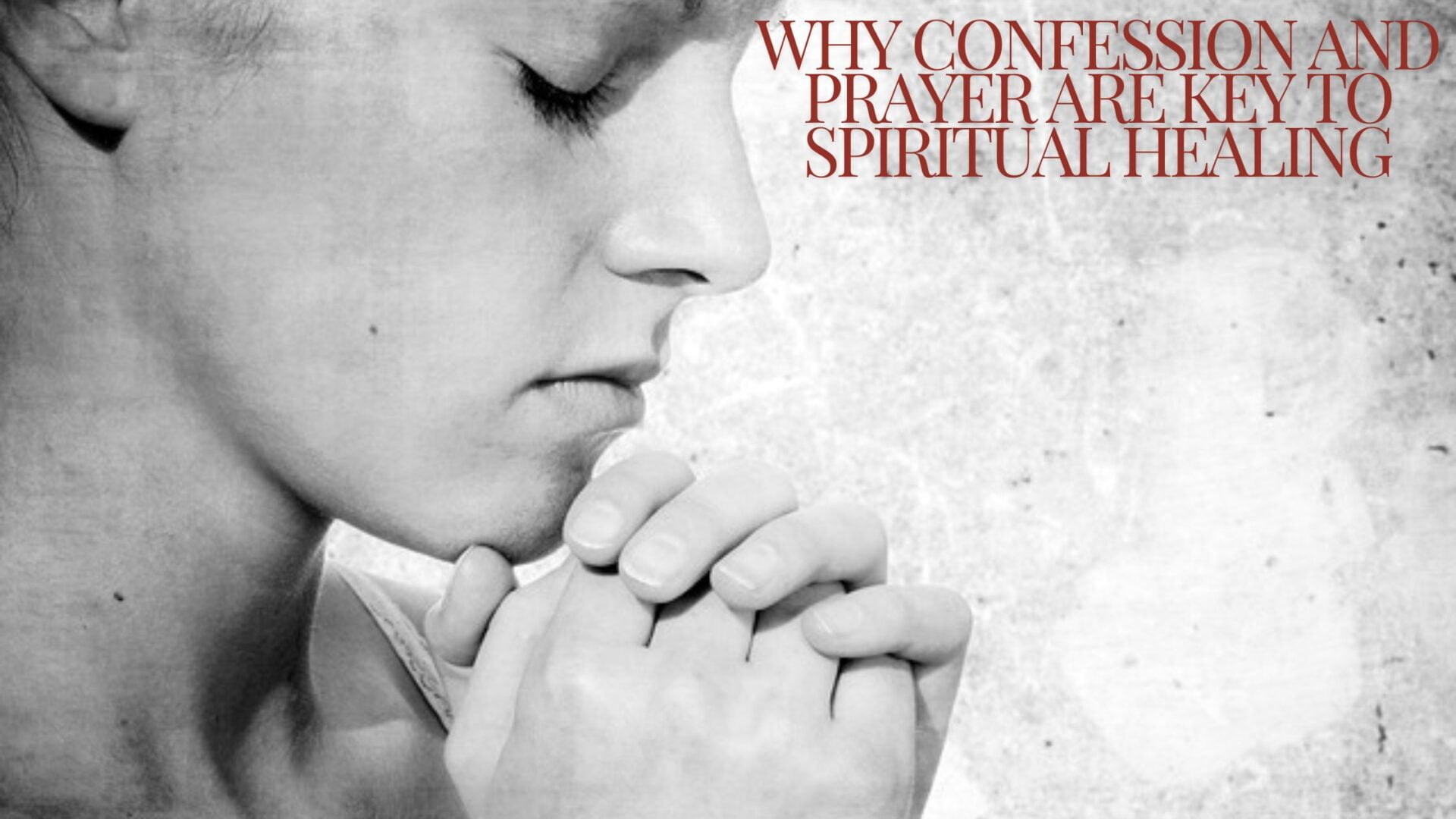Introduction:-
Why Confession and Prayer Are Key to Spiritual Healing

In our whirlwind world, spiritual healing often plays second fiddle to the pressing needs of everyday life. However, for many, it’s indispensable for maintaining holistic well-being. James 5:16 offers a profound insight into this matter, emphasizing two pivotal components of spiritual healing: confession and prayer. But why are these practices so crucial? Let’s delve into their significance and explore how they contribute to spiritual health.
The Interconnectedness of Confession and Prayer: A Harmonious Duet
While confession and prayer are powerful on their own, their combined effect can significantly enhance spiritual healing. When we confess our sins and pray for each other, we create a supportive environment where healing can flourish. This synergy fosters a sense of community, accountability, and mutual encouragement, which are all crucial for spiritual growth.
Practical Steps to Incorporate Confession and Prayer
Here are some practical steps to integrate confession and prayer into your spiritual routine:
1. Find a Trustworthy Confidant: Choose someone you trust and feel comfortable with to share your confessions. This could be a close friend, family member, or spiritual advisor.
2. Schedule Regular Prayer Time: Dedicate a specific time each day for prayer. This consistency will help you build a strong prayer habit.
3. Join a Prayer Group: Participating in a prayer group can provide additional support and encouragement. It’s also a great way to pray for others and receive prayers in return.
4. Keep a Prayer Journal: Writing down your prayers and confessions can help you reflect on your spiritual journey and see how God has worked in your life.
What are the spiritual benefits of confessing sins?
Confessing sins is a practice found in many religious traditions, and it is believed to offer several spiritual benefits. These benefits often revolve around personal growth, improved relationships, and a deeper connection with the divine. Here are some of the key spiritual benefits of confessing sins:

- Spiritual Cleansing and Renewal:
- Confession is often seen as a way to cleanse the soul from the burden of sin. This act of admitting wrongdoing can lead to a sense of renewal and spiritual purification, allowing individuals to start afresh.
- Healing and Forgiveness:
- Confessing sins can bring about a sense of forgiveness, both from the divine and from oneself. This forgiveness is essential for healing past wounds and moving forward without the weight of guilt.
- Increased Humility:
- Acknowledging one’s sins requires humility. This humility is a vital spiritual virtue that helps individuals recognize their limitations and dependence on a higher power.
- Restored Relationships:
- Sin often damages relationships, both with other people and with the divine. Confession can be the first step in repairing these relationships, leading to reconciliation and restored harmony.
- Inner Peace and Reduced Anxiety:
- Carrying the burden of unconfessed sins can lead to anxiety and inner turmoil. Confession can alleviate this psychological and spiritual stress, leading to a sense of inner peace and relief.
- Personal Accountability and Growth:
- Confession encourages personal accountability and responsibility for one’s actions. This self-awareness is crucial for spiritual growth and moral development.
- Enhanced Spiritual Discernment:
- By regularly examining one’s actions and confessing sins, individuals may develop greater spiritual discernment. This can help them make better choices and avoid future sin.
- Strengthened Faith and Trust:
- Confession can deepen one’s faith and trust in the divine. Believers often find that the act of confessing and receiving forgiveness reinforces their trust in God’s mercy and love.
- Community and Support:
- In many religious traditions, confession is a communal act. Sharing one’s struggles and sins with a trusted spiritual advisor or within a faith community can provide support, encouragement, and accountability.
- Alignment with Divine Will:
- Confession helps individuals align their lives more closely with the teachings and will of their faith tradition. This alignment fosters a deeper spiritual connection and a more devout life.
Each of these benefits contributes to an individual’s overall spiritual well-being, helping them to live a more meaningful, peaceful, and spiritually fulfilled life.
How does confessing sins to others strengthen relationships?
Confessing sins to others can significantly strengthen relationships in several ways:

- Building Trust:
- Honesty is a cornerstone of trust in any relationship. When you confess your wrongdoings to someone else, it demonstrates a willingness to be open and transparent, which can enhance the trust between you.
- Promoting Forgiveness and Reconciliation:
- Confession is often the first step towards seeking forgiveness. Acknowledging your mistakes shows that you are genuinely remorseful, paving the way for the other person to forgive and for both parties to reconcile and move forward.
- Encouraging Vulnerability and Intimacy:
- Confessing sins requires vulnerability. This vulnerability can foster deeper emotional intimacy, as it shows a level of trust and openness that encourages others to reciprocate, leading to a more profound and meaningful connection.
- Enhancing Communication:
- Discussing mistakes and transgressions openly improves communication. It encourages honest dialogue about issues that might otherwise remain unresolved, leading to a clearer understanding of each other’s feelings and perspectives.
- Fostering Empathy and Compassion:
- When someone confesses their sins, it provides an opportunity for the other person to practice empathy and compassion. Understanding the reasons behind someone’s actions can lead to greater empathy and a more compassionate response.
- Reducing Resentment and Misunderstandings:
- Unconfessed sins can fester and lead to resentment and misunderstandings. By confessing, you address issues directly, preventing negative feelings from building up and creating barriers in the relationship.
- Demonstrating Commitment to Improvement:
- Confession can show that you are committed to personal growth and improving the relationship. It indicates that you recognize your faults and are willing to work on them, which can inspire confidence and support from others.
- Creating a Culture of Accountability:
- When you confess your sins, it sets a precedent for accountability within the relationship. This can encourage both parties to take responsibility for their actions, leading to a healthier and more balanced dynamic.
- Breaking Down Walls of Isolation:
- Guilt and shame can lead to isolation. Confessing sins breaks down these walls and allows for genuine connection and support, helping to overcome feelings of isolation and loneliness.
- Providing a Path for Mutual Support:
- Confession can open the door for mutual support. The other person can offer guidance, encouragement, and help in overcoming the challenges and behaviors that led to the sin, strengthening the bond between you.
Why do Christians emphasize confession and prayer for healing?
Christians emphasize the practices of confession and prayer for healing for several theological, spiritual, and practical reasons. These practices are rooted in biblical teachings and the understanding of how sin and reconciliation affect relationships.
Key Reasons:
- Biblical Foundation:
- The Bible, specifically in James 5:16, highlights the significance of confession and prayer for healing. This verse establishes a direct connection between confession, prayer, and healing, emphasizing their importance in Christian practice.
- Restoration of Relationship with God:
- Sin is viewed as a barrier that separates individuals from God. Confession is a means to acknowledge and repent for sins, enabling the restoration of the relationship with God. Prayer serves as a channel for communication, seeking forgiveness, and receiving God’s grace and healing.
- Inner Healing and Peace:
- Confession and prayer contribute to inner healing by releasing the burden of guilt and shame associated with sin. Through confession, individuals can receive God’s forgiveness, leading to peace of mind and a clear conscience.
- Spiritual Growth and Maturity:
- Confession and prayer are essential for spiritual growth and maturity. They help individuals recognize their shortcomings, humble themselves before God, and seek His guidance. This process promotes self-awareness, repentance, and the development of a closer relationship with God.
- Practical Application:
- Confession and prayer are not just theological concepts but have practical implications for believers. They provide a framework for addressing conflicts, seeking reconciliation with others, and experiencing healing in various aspects of life.
Conclusion
Confession and prayer are essential for spiritual healing and enhancing our relationship with God. They offer inner peace, promote accountability, and facilitate community support. These acts connect us with the divine, providing guidance, forgiveness, and strength.
FAQs:
1. Why is confession important for spiritual healing?
Confession is important because it allows individuals to release the burden of guilt, fosters accountability, strengthens relationships, and encourages humility. By admitting our wrongdoings, we open ourselves to God’s grace and the support of our community.
2. How does prayer contribute to spiritual healing?
Prayer connects us directly with God, promoting inner peace, providing clarity and guidance, and strengthening community bonds. It helps us to surrender our worries and trust in God’s plan, enhancing our spiritual well-being.
3. Can I confess my sins to anyone?
While you can confess to anyone you trust, it’s often beneficial to choose someone who understands the spiritual significance of confession, such as a close friend, family member, or spiritual advisor. The key is to find someone who offers a safe, non-judgmental space.
References
1. Bible Gateway – James 5:16 (NIV): Provides the full text of James 5:16 and other related scriptures. Bible Gateway
2. American Psychological Association (APA) – Discusses the psychological benefits of confession, including reduced stress and improved mental health. APA on Confession
3. Mayo Clinic – Explores the health benefits of prayer and spirituality, including stress reduction and improved mental health. Mayo Clinic on Prayer








